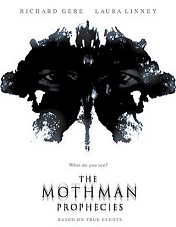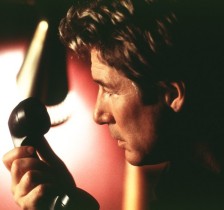|
The Mothman Prophecies
|
| |
 |
USA, 2002. Rated PG-13. 132 minutes.
Cast:
Richard Gere, Laura Linney, Will Patton, Debra Messing, Lucinda Jenney,
Alan Bates, Nesbitt Blaisdell, Clay Bunting, Dan Callahan, Murphy Dunne,
David Eigenberg, Christin Frame
Writers: Richard Hatem, based on the book by John A. Keel
Music: Tom Hajdu & Andy Milburn (as "tomandandy"), Jeff Rona
Cinematographer: Fred Murphy
Producers: Gary W. Goldsetin, Gary Lucchesi, Tom Rosenberg
Director: Mark Pellington
LINKS
|
 t
was inevitable. With the blockbuster success of director M. Night Shyamalan
(The Sixth Sense and Unbreakable),
it was inevitable that other, less original directors would watch his movies
and say, "Hey! I can do that, too!"
t
was inevitable. With the blockbuster success of director M. Night Shyamalan
(The Sixth Sense and Unbreakable),
it was inevitable that other, less original directors would watch his movies
and say, "Hey! I can do that, too!"
In this case that director is Mark Pellington, who has the dubious honor of
having directed Arlington Road. There,
he imitated in exaggerated fashion more accomplished creepy political conspiracy
movies with not unentertaining results, but it was not a movie you'd remember
even a week later. A similar thing happens with The Mothman Prophecies,
a markedly better and more sophisticated movie, though still derivative at its
core. Pellington does establish a Shyamalan mood, only to break it too often
with overstated visual and musical cues and other unnecessary embellishments.
The pervasive creepiness of Shyamalan's works stems not only the dark composition
with much of the color sucked out of it, but also from the low-key style. Pellington's
motifs are more subtle and effective--note the recurring appearance of red lights
and traffic signals, for example.
The Mothman Prophecies is based on the premise that for centuries and
across cultures, there have been sightings of an entity resembling a human-sized
moth in conjunction with major disasters. According to the film's official
site, there were at least twelve Mothman sightings and other odd incidents
prior to the Chernobyl nuclear disaster of 1986. Similarly, there were multiple
Mothman sightings before and during the Xiaon Te Dam collapse in China in 1926,
a 1983 plane disappearance in the Bermuda triangle, a 1978 mine collapse in
Germany, and an earthquake in Chicago in 1951--the only earthquake in the city's
history. In many cases, the Mothman has been credited with saving lives by luring
or scaring people away from the disaster. In some cases it seems to have caused
death, including an appearance during the Crimean War in which it allegedly
catalyzed the bloodiest battle of the war.
The movie itself chronicles the events leading up to a disaster that occurred
in Point Pleasant, West Virginia, in 1967, as described in a book by John Keel.
Before the disaster, there were more than one hundred reports of Mothman sightings,
as well as other anomalies (the usual UFO sightings, green aliens with anal
probes, etc.), many of which were reported in the local paper and enough to
convince most people there was something funny going on.
Whether the Mothman is an actual being with a physical form or a fabricated
product of our collective unconscious (or both), the movie does not say. In
the movie, the apparition seems to use electricity as a medium to manifest itself
physically; i.e., through telephone lines. Does the entity actually cause the
accidents and disasters portrayed in the movie or merely presage them? The
Mothman Prophecies does not say. In fact, The Mothman Prophecies
doesn't answer questions at all.
The most problematic unanswered question is not, "What is the Mothman?" That
issue is best left unresolved. Any specific answer is going to be less satisfying
than what audience members can fill in with their imagination, which will differ
from one audience member to the next, depending on the beliefs and experiences
of each. No, the most problematic question is, "How the heck does Richard Gere
fit into any of this?"
Gere is Richard Klein, a respected reporter for The Washington Post,
whose wife Mary (Debra Messing) dies after Something causes a car accident.
Mary (always a symbolic name) doesn't actually die from the accident, but from
a brain tumor discovered during the subsequent brain scans. Before she goes,
she wonders if Richard saw "it," too. After Mary's death, Richard discovers
that her journal is full of drawings of a moth-like black creature.
Two years later, Richard drives to Richmond to interview the governor of Virginia,
a leading candidate for president. Somehow, he winds up 400 miles away, in a
different direction, in Point Pleasant. That's when things get really weird.
Richard's odd arrival is only the latest in a series of bizarre disturbances.
With the assistance of police sergeant Laura Linney and townsman Will Patton,
Richard investigates, soon becoming convinced that the events in Point Pleasant
and Mary's death are somehow connected. But how?
There's the rub. Instead of answering the question it has spent well over an
hour setting up, The Mothman Prophecies distracts us with the impending
doom. It may not matter to you, because the climactic events are so well realized
that you may forget all about the original conflict, just like the movie does.
It is, nevertheless, a gaping hole in the story. There may, in fact, be a connection
between Richard and Point Pleasant, but without further exploration of that
connection, the entire first part of the movie plays like an extended contrivance
designed only to get Richard to Point Pleasant.
Partly compensating for this lack of follow-through, The Mothman Prophecies
features thoughtful content about the nature and history of the Mothman, touching
on aspects of synchronicity and the collective unconscious. It's been a good
patch for movies about significant dreams and alternate planes of existence
(see Vanilla Sky, Donnie Darko, Waking
Life, etc.) One particularly memorable exchange in The Mothman Prophecies
has expert-of-the-bizarre Alexander Leek (Alan Bates) explaining that the Mothman
is a higher form of life. He compares it to a window washer high up on a nearby
building, in that the Mothman has a perspective that allows it to see things
we normal humans cannot. It's trying to communicate with us. Richard wonders
why the Mothman doesn't just explain itself more clearly. Leek responds, "Have
you ever tried explaining yourself to a cockroach?"
Gere is actually pretty good in this, reigning in many of his distinctive tics,
including his habit of conveying his characters emotions via the rate of his
blinking. He and Linney, who worked together in Primal
Fear share some chemistry, and Gere is one older actor who doesn't look
completely ridiculous when paired with women fifteen (Linney) to twenty (Messing)
years younger. As long as they aren't named Winona Ryder.
Derivative or no, The Mothman Prophecies fulfills its basic thriller
mandate with greater intelligence than much of its cinematic competition. The
grand finale alone--a nerve-fraying set piece, enhanced by masterful film editing,
camerawork, and special effects--makes the movie worth seeing. During a typical
winter of cinematic discontent and sparse offerings, The Mothman Prophecies
is a decent option.
Review
© February 2002 by AboutFilm.Com and the author.
Images © 2001 Lakeshore Entertainment Corp. and ScreenGems, Inc. All Rights
Reserved.


